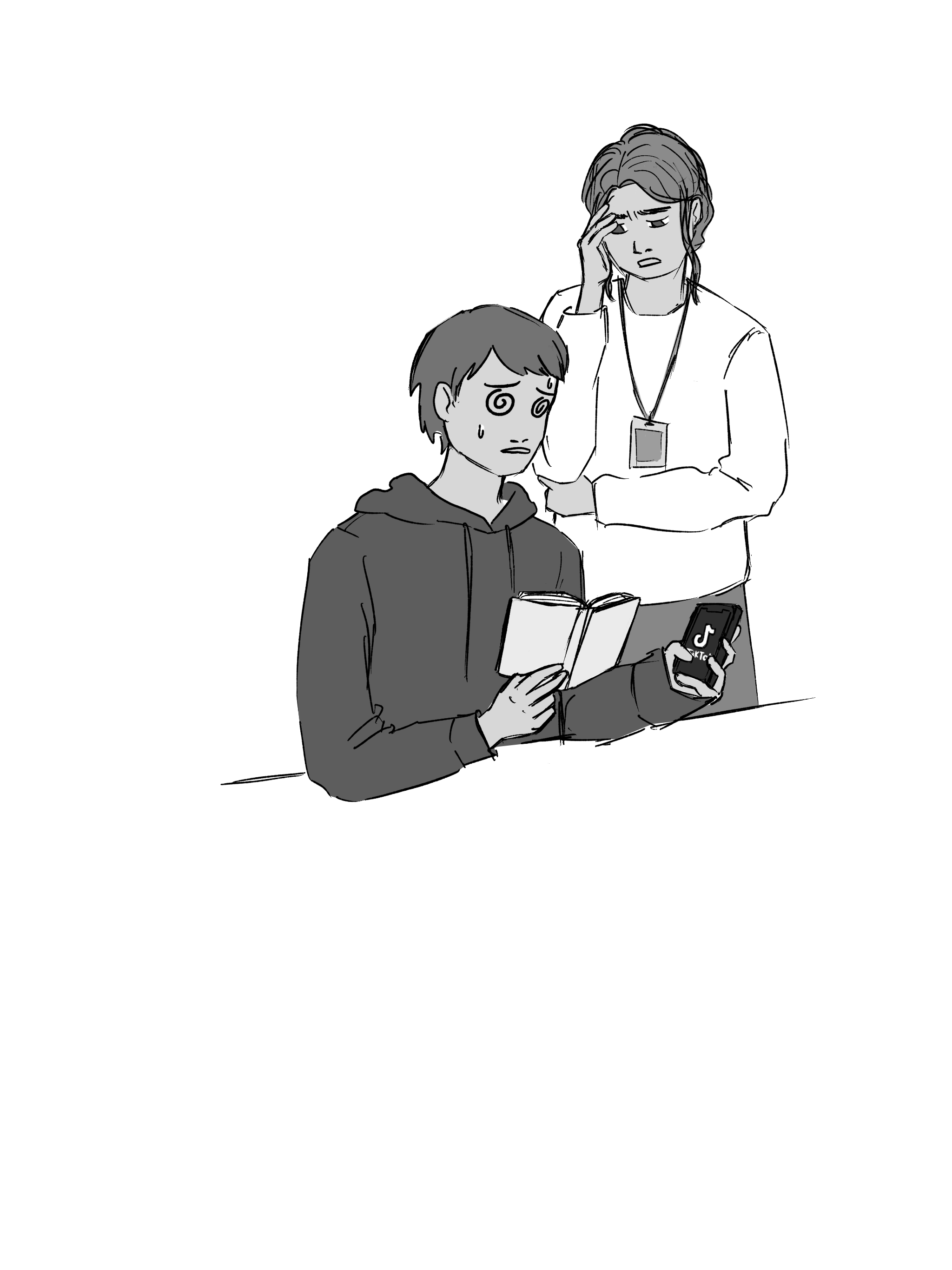Students Who Can’t Read Books,” caused quite a stir online. The article puts a spotlight on college professors’ surprising realization that many college freshmen struggle with reading multiple books per semester. Being able to read so much used to be standard, but because of a lack of preparation by middle and high schools, many college freshmen struggle to read whole books, being more used to excerpts or chapters.
It seems that smartphones are to blame. “Reading books, even for pleasure, can’t compete with TikTok, Instagram, and YouTube,” said Rose Horowitch, the article’s author.
She also pointed to test-oriented education steering instruction away from reading whole books, instead assigning students to read excerpts and individual chapters. Indeed, look no further than the format of the new digital SAT: in the Reading and Writing sections, the “archaic” poems have completely disappeared, and the infamous 100-line reading passages have shrunk to single paragraphs.
These diagnoses seem reasonable but are incomplete. Smartphones aren’t the first challenge books have faced. According to Britannica, the popularity of radio broadcasting in the 1920s already spelled trouble for reading. The Atlantic reported that by the 1960s, Americans were spending on average four to five hours a day watching TV and reading time had dwindled down to just 15 to 30 minutes a day. In the battle for our leisure time, books have sadly already lost a long time ago to other easier-toconsume media formats.
Even when students do sit down and read, classical literature is increasingly crowded out by a sea of choices in YA fiction. Thanks to the phenomenal commercial successes of “Harry Potter” that made J.K. Rowling the highest paid author to date and Suzanne Collins’s “The Hunger Games” series that garnered $3.3 billion worldwide through movie adaptations, authors and publishing houses have flocked to the YA category, hoping to replicate these earlier triumphs. In the 1990s, only about 400 to 500 YA book titles were published each year. That number soared to 1,400 to 1,500 only two decades later. Don’t get me wrong – some YA novels are quite fun to read. It’s definitely better to read them than to not read at all. The problem is that the reading levels of many popular YA novels are simply too elementary to prepare students for post-secondary education and beyond. The top ten most popular YA books on Goodreads sport an average Lexile measure, a scientific indicator of text difficulty, of just 775. That’s the equivalent of a fourth-grade reading level.
While the sales of YA books have plateaued in recent years, graphic novels and comic books saw a 62 percent jump in sales in 2021. Publishing industry insiders argue that the manga versions of classics like “Pride and Prejudice” and “Macbeth” make these works more accessible. While that may be true, graphic novels provide immediate representations of characters, settings, and emotions, removing the element of imagination and the critical skill of interpreting the author’s words that are an integral part of the reading experience. Even worse, graphic novel adaptations often end up serving as substitutes rather than springboards to the original texts.
This includes our school too — according to PHS librarian Jen Bigioni, between the 10,121 titles borrowed across physical and digital sources, most were in the fantasy Young Adult (YA) and manga genres.
Just because students are short on time and commercial interest is reducing reading to the most basic level, it is still worth it for us to fight this uphill battle for reading whole, sophisticated books.
I don’t object to reading excerpts and chapters. But just like how food samples in grocery stores can never replace regular meals, reading whole books is a completely different experience to only sampling chapters. Reading whole books offers the thrill of the twists and turns of the plots, the satisfaction of the grand finale, and most importantly, the understanding of the complexity of the human experience. If you only read the courtroom chapter of “To Kill A Mockingbird,” you would mistake Atticus Finch as an anti-racist advocate and miss the nuance that he, too, possesses the racial biases of his time. Through reading whole books, we learn to see the world not just in black and white, but also the infinite shades of gray in between. Moreover, reading books cover to cover will be a great way to acquire new knowledge after we complete our formal education. One of our school district’s goals is to instill passion and curiosity in students to become lifelong learners. Without the skill and stamina to complete whole books, learning comes to an end when there are no more tests administered to us.
Adding on to all of this, education was once affordable only to the rich and powerful; reading books was an upperclass activity for much of human history. However, in the 1400s, the invention of the Gutenberg printing press revolutionized the dissemination of information and increased access to knowledge. It was the spread of books like John Locke’s “Two Treatises of Government” and Jean Jacques Rousseau’s “Social Contract” that ushered in the Enlightenment Age and built the philosophical foundation of modern democratic societies. Throughout history, the widespread access to books has driven human progress, but if we let reading once again become a luxury of a few, it will be a major step back in human progress.
